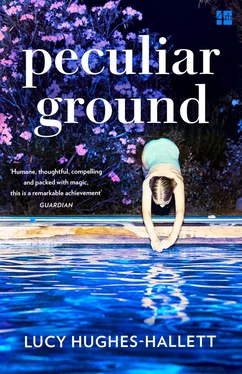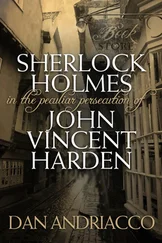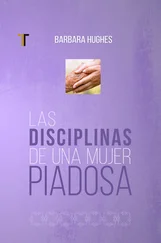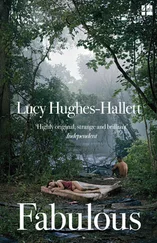These comings and goings, furtive as those of fox or stoat, are the means by which a society maintains itself. Trade routes, the paths along which babies are carried to the grandparents who will tend them while their mothers work, the tracks down which the workers plod outward at dawn, and homeward at evening. All these scarcely visible, unsanctioned thoroughfares cross the park. All will become impassable once the wall rises, with its iron gates, its lodges like guard-houses, its rigid distinction between the privileged space within it, and the inferior world without.
I have spoken to my cousin [writes Cecily], but his misfortunes have marred him. He longs for privacy, for a place in which he can confine himself, and where he can play unrebuked. You will have noticed how childlike he is.
With his grand projects, he has thoughtlessly exposed us to the jealousy of the intolerant. Among the labourers who have come to carry out the works there are those who hate and fear people of our persuasion.
Meg was ill-treated by some of the ignorant who, having no authority, have only fists and violent words as weapons. My cousin can quell them. But those who broke in upon us, as you saw, carried the King’s warrant. Some of our friends have been carted away – to Oxford, we believe. I fear for them.
She sent me no tender glance yesterday. Nor does her letter contain any word that might not have been addressed to a formal acquaintance.
*
Mr Goodyear fell into step beside me as I walked in the park this morning. It is not only his troop of foresters who acknowledge his authority. I have noticed how the generality of my Lord’s people defer to him. I believe that he and Meg Leafield are nearly related. A great estate is like an island, a closed community whose denizens must perforce marry each other, so that it is not uncommon for all to be connected by ties of blood, but these two – an old woman, spry of intellect but creaking of body, and a thriving man who, were he but a gentleman, would be admired as a modern Hercules – have some especial bond.
‘You’d think, wouldn’t you, sir, that being as proud as he is of that coloured pavement, Lord Woldingham would wish it preserved.’ Goodyear had been an onlooker at my Lord’s fête at the house of Bacchus.
‘Most certainly.’
‘So why is he allowing you to drown it?’
I explained that no such thing was intended. The lake-waters, if my calculations prove true, will rise to approximately two feet beneath the level of the Roman villa’s floor. ‘It will be preserved most carefully. It will make a charming picture, when the undergrowth is cleared away from the ruins and the ancient archway is reflected in the water.’
Goodyear nodded. ‘There is another one, you know,’ he said.
‘Another picture in mosaic?’
‘Beneath the chapel.’
‘Chapel?’ Lord Woldingham laughs at me for being as tedious a parrot as Carisbrooke. But one can gain time, in conversation, by repetition.
‘You were there yesterday.’
At Wychwood, there are eyes in every tree.
‘Be so kind as to tell me about it.’
‘When Miss Cecily’s uncle was choosing a spot for his meeting-house, as he called it, he asked me for my opinion.’
Nearly all those who now serve their returned Lord have passed years living here without him. Only gradually will he discover what they know about his land.
‘I took him to that place because the ground is level and easily worked. There’s water. And there’s the pebble-picture. I said to him, “The two lads will bring you luck.”’
He waited. I took my cue, parrot-fashion. ‘The two lads?’
‘That’s the picture, you see. Two boys. Little ones. Lying as it were, head to tail, to make a ring. There’s a story about them.’
I had only to nod for him to proceed.
‘There was once a king’s son, and in the same city there was a wise woman, and the wise woman had a son too. And there came a great rain, and the waters rose until there was no more difference between the land and the sea. And all the animals crowded onto hilltops that stood up out of the water like islands. And the people gathered there too.’
Goodyear had adopted an incantatory style of speech, as storytellers do, but he lapsed back into his normal pitch to deliver a piece of commentary. ‘It’s much like the story of the great flood in Noah’s time, you’ll be thinking, sir?’ I nodded again. He went on.
‘The King saw that there were no fields to till, and no green stuff for the cattle to eat. And he called the wise woman. And he said to her, “How am I to save my people?” She said, “You must take the thing you love most in the world and set it in a boat and send it out onto the water, and the rains will cease.” So the King set his crown on a damask cushion, and placed it in an ivory casket, and put it in a boat, and caused that boat to be launched out onto the current. He stood on the shore, weeping and wringing his hands as the boat went swiftly towards the horizon, and he saw that it was seized by a whirlpool, and sucked down into the belly of the flood. He waited then for the rain to cease, but instead the wind grew wilder, and where the rain had fallen before like water gushing from a drainpipe, it began now to fall like cascades from heaven.
‘The King called for the wise woman and told her what he had done, and she said, “What a man feels for a circle of gold is covetousness. What a man feels for a crown is a lust for power. I spoke of love.”
‘The King had a horse. He had bought the creature from a merchant who came each year from the East with a ship laden with wonderful things. The horse was faster than any other in the country and its coat shone like quicksilver. It knew its master so well, and was so obedient to him, that when the King rode upon it it was as though he had become like the centaur, in which man and beast are as one. That horse, too, the King sent out onto the waters. That horse, too, was swallowed down by the flood. And instead of ceasing, the rain fell so thick it was as though the ocean had mounted up in one great watery mass, to fall again on earth.
‘The King called for the wise woman again. He said, “I have given the crown, which is the token of my magnificence and my power. I have given the horse, that performed my will as readily as my hand does, and that could outrun the wind, and that would take sugar from my palm with lips that were as soft as velvet and as feeling as a musician’s fingertips.” She said, “What kind of a father are you?” And he understood her, and he fell to his knees on the ground, and his gorgeous robes were sodden with the wetness that was all around, and he said, “No. Not for my kingdom. Not for all my people. Not my son.” And the wise woman said, “You must.” He said, “What you ask of me is cruel. You too have a son. Would you do so?” and she said, “I would and I will.”
‘So the young prince came out of the palace and the wise woman’s son was waiting for him by the shore. The two boys had been born on the same day, and they were as like as your left foot is to your right foot. They were both dressed in smocks of sky-blue, and they sat side by side in the boat, and none knew any more which was the prince and which was the cunning woman’s child. And the boat was launched upon the flood.
‘The whirlpool seized it, as it had seized the others, and then the two boys held out their arms to each other, and they tilted their heads back as dancers do when they dance in a ring. The boat went from under their feet and was lost to them in the depths of the ocean. The spinning water whirled them about, but, as it turned them, so they turned within it, and their circled arms were as a wheel laid flat upon the water, and that wheel turned faster and ever faster, till those whirling boys rose into the air, and the speed of their spinning was such that it carried them on upwards until all that could be seen of them was a circlet of blueness against the terrible black of the storm clouds. And the rain stopped absolutely, and the clouds were driven from the sky. The King and the wise woman stood together watching, with tears clouding their sight, but had they been as sharp-eyed as killer birds they would have seen their children no more.’
Читать дальше











